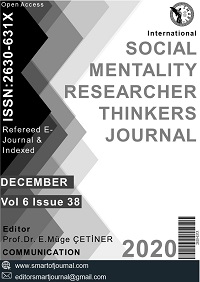Author :
Abstract
Salgın hastalıklar tarih boyunca insan topluluklarını derinden etkileyen önemli demografik, sosyal, siyasal, ekonomik sonuçlar doğuran problemler olarak karşımıza çıkmaktadır. 31 Aralık 2019 tarihinde Çin’in Wuhan şehrinden başlayarak kısa süre içerisinde tüm dünyaya yayılan Covid-19 salgını ile birlikte sosyal hareketlilik durma noktasına gelmiş, şirketler ve eğitim kurumları yeni iletişim teknolojileri ve internet sayesinde faaliyetlerini uzaktan sürdürmek durumunda kalmıştır. Dolayısıyla insanlar, kendi yaşam alanlarında zorunlu olarak bir karantina sürecine girerek sosyal hayattan izole bir yaşam sürdürmek aynı zamanda günlük rutinlerini uzaktan kontrol etmek zorunda kalmıştır. İşte bu çalışmada; farklı yaş grupları, cinsiyet, medeni durum ve farklı sektörlerden 8 kişi ile yapılan derinlemesine görüşme ile salgın döneminin doğurduğu en tabi sonuçlarla beraber aile içi iletişim ve üretim ilişkileri sorgulanmıştır. Nihai sonuç olarak, yeni iletişim teknolojileri ile birlikte iletişim süreci farklı bir boyut kazanmıştır. İzolasyon sürecinde iletişim kurma biçimlerimizin değiştiği ve internet kullanımının önemli ölçüde arttığı gözlemlenmiştir. Ayrıca görüşmeler neticesinde, salgın dönemi öncesinde aile içi iletişimi olumsuz yönde etkilediği yönünde olumsuz eleştirilere maruz kalan sosyal medya, salgın döneminde bireylerin iletişimlerini bu mecralardan yürütülmesine olanak tanıyarak birleştirici bir rol üstlenmiştir.
Keywords
Abstract
Epidemics has emerged as problems that has significant demographic, social, political and economic consequences that has deeply affected human communities throughout history. With Covid-19 outbreak that spread to the whole world, by starting from Wuhan city of China on December 31, 2019, social mobility came to a halt, companies and educational institutions had to continue their activities remotely thanks to the new communication technologies and the internet. Therefore, people had to entered a quarantine process in their living spaces, to live an isolated life from social life also to control their daily routines remotely. In this study; In-depth communication with 8 people from different age groups, gender, marital status and different sectors and inter-family communication and production relations, together with the most natural consequences of the epidemic period, were questioned. As a result, the communication process has gained a different dimension with the new communication technologies. It has been observed that the way we communicate in the isolation process has changed and the use of the internet has increased significantly. Also, as a result of the interviews, social media, which was exposed to negative criticism that it had negative effects on inter-family communication before the epidemic period, take on a task a unifying role by allowing individuals to carry out their communication through these channels during the epidemic period.
Keywords
- Bakan, U. ve Bakan, U. (2017). Facebook’ta Aile İlişkileri Ve Sosyal Medya Adanmışlığına
- Bakan, U. ve Bakan, U. (2017). Facebook’ta Aile İlişkileri Ve Sosyal Medya AdanmışlığınaYönelik Bir İçerik Analizi, Mehmet Akif Ersoy Üniversitesi, Sosyal Bilimler Enstitüsü Dergisi, Cilt. 9, Sayı: 20, 54-68.
- Boschele Aydoğan, Filiz https://dokuz8haber.net/kose-yazilari/corona-gunlerinde-calisma-ve- serbest-zaman/ (Erişim Tarihi: 15.05.2020).
- Engels, Friendrich (1990). Ailenin Özel Mülkiyetin ve Devletin Kökenleri (Çeviren: Kenan Somer). Ankara: Sol Yayınları.
- Eraslan, L. (2020). '4 günlük sokağa çıkma yasağında internet kullanımı 4 kat arttı'. Retrieved from https://www.sondakika.com/haber/haber-4-gunluk-sokaga-cikma-yasaginda-internet-kullanimi-
- Erdoğan, İrfan (2013). Medyaya Marx Gibi Bakmak.
- Fuchs, Christian (2016). Sosyal Medya Eleştirel Bir Giriş, (Çeviren Diyar Saraçoğlu, İlker Kalaycı). Ankara: NotaBene Yayınları.
- Geray, Haluk (2017). “Toplumsal Araştırmalarda Nicel ve Nitel Yöntemlere Giriş, İletişim Alanından Örneklerle” İskitler-Ankara, Ütopya Yayınevi.
- Jenkins, H. (2018). Medya Yöndeşmesinin Kültürel Mantığı. In f. Aydoğan (Ed.), Yeni Medya Kuramları (pp. 39-45). İstanbul: Der Yayınları.
- Jenkins, H. (2020). Prof. Dr. Henry Jenkins: “Teknolojinin, hem birleştirici hem de izole edici etkileri var…”. In İ. Üniversitesi (Ed.).
- Kandiyoti, D. (2013). Cariyeler, Bacılar, Yurttaşlar (4. Baskı). İstanbul: Metis Yayınları.
- Karasar, Niyazi (2019). Bilimsel Araştırma Yöntemi Kavramlar İlkeler Teknikler. Ankara: Nobel Yayınları.
- Kırık, A. M., & Özkoçak, V. (2020). Yenİ Dünya Düzenİ Bağlaminda Sosyal Medya Ve Yeni Koronavirüs (Covid-19) Pandemİsİ. Sosyal Bilimler Dergisi, 7(45), 133-145.
- Kırık, A. M. (2014). Aile ve Çocuk İlişkisinde İnternetin Yeri: Nitel Bir Araştırma, Eğitim ve Öğretim Araştırmaları Dergisi, Cilt. 3, Sayı: 1, 337-347.
- Kindersley, D. (2018). History of the World Map by Map. London: Dorling Kindersley Publishing.
- Marx, Karl (1997). Hegel’in Hukuk Felsefesinin Eleştirisi, (Çeviren Kenan Somer). Ankara: SolMarx, Karl, Friedrich Engels (1992). Alman İdeolojisi, (Çeviren: Sevim Belli). Ankara: Sol Mckeever, A. (2020). What is the coronavirus?
- McLuhan, M. (1962). Gutenberg Galaxy: The Making of Typographic Man. London: Routledge. McLuhan, M. (2001). The Medium is the Massage. Corte Madera: Ginko Press.
- Neuman, W.L. ( 2006). Toplumsal Araştırma Yöntemleri: Nicel ve Nitel Yaklaşımlar (2. Cilt), (Çeviren: Sedef Özge). Ankara:Yayın Odası.
- Özkaplan, N. (2010). Duygusal Emek ve Kadın İşi/ Erkek İşi. U. Serdaroğlu (Ed.). İktisat ve Toplumsal Cinsiyet (1. Basım, 38-48). Ankara: Efil Yayınevi.
- Pandey, A. (2020). Korona dijital adaletsizliği derinleştirdi, https://www.dw.com/tr/korona-dijital- adaletsizli%C4%9Fi-derinle%C5%9Ftirdi/a-53079983.
- Shaw, W. H. (1979). "The Handmill Gives You the Feudal Lord": Marx's Technological Determinism. History and Theory, 18(2), 155-176.
- Villegas, A. (2013) The Influence of Technology on Family Dynamics, Proceedings of The New York State Communication Association, Vol. 2012, Article 10. 1-17.
- Zenelaj, B. (2014). Pazarlama Stratejisi Olarak Sosyal Medya İletişimi ile Kurumsal İtibarıOluşturmak: İletişim Sektöründe Bir Araştırma. Yüksek Lisans Tezi, Selçuk Üniversitesi, Konya.
- WHO. (2020). WHO Coronavirus Disease (COVID-19) Dashboard. from https://covid19.who.int/ Erişim Tarihi: 15.05.2020
- Coronavirus günlerinde online alışveriş istatistikleri. https://digitalage.com.tr/coronavirus- gunlerinde-online-alisveris-istatistikleri/. Adresinden alındı. (Erişim Tarihi: 17.05.2020).
- Koronavirüs Sosyal Medyaya Nasıl Yansıdı? https://www.thebrandage.com/koronavirus-sosyal- medyaya-nasil-yansidi-10410. Adresinden alındı. (Erişim Tarihi: 18.05.2020).
- Basın Açıklamaları http://www.keig.org/korona-salgininin-yarattigi-kriz-kadin-emegi-acisindan-ne- ifade-ediyor/ adresinden alındı. Erişim Tarihi: 16.05.2020
- We Are Social’ın Koronavirüs Raporu Yayınlandı! (Covid-19) adresinden alındı.https://www.clicksus.com/blog/we-are-socialin-koronavirus-raporu-yayinlandi-covid-19/, Erişim Tarihi: 17.05.2020





